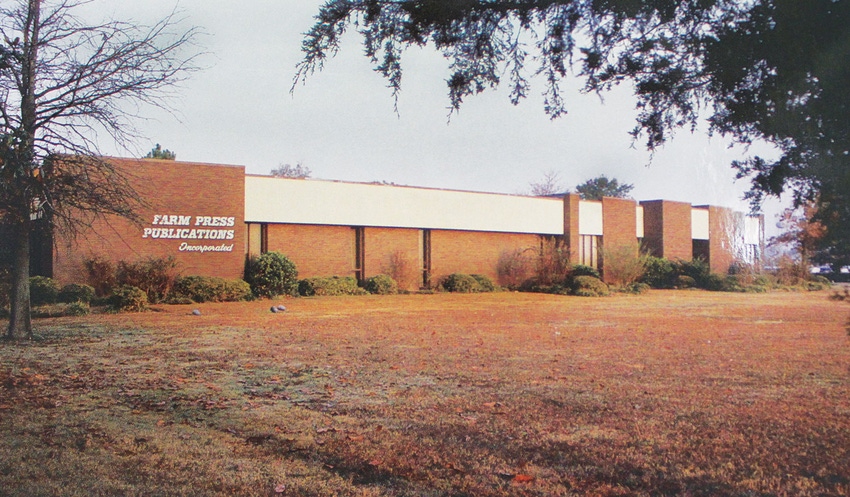
What would have been the odds, one might reasonably wonder, that an afterthought four-page agricultural “newspaper,” consisting mostly of rerun ads from a local small town Mississippi paper, plus some Extension releases and a few bits of farm news, would within 30 years mushroom into an agricultural publishing success story, with four regional editions covering all the Sunbelt states and reaching nearly a quarter-million farmers?
Very slim chances, one might well think — even slimmer that the company built around that publication would still be going strong 75 years later.
But three-quarters of a century gone, the region’s and the nation’s agriculture having undergone tremendous (and amazing) changes, here Delta Farm Press still is, continuing the promise of that early-day shoestring venture: “Dedicated to the development of the Delta” (later revised to “Timely, reliable information for Mid-South agriculture”.
That homely little four-page publication, with the mailbox logo at the top of the front page, grew steadily in circulation, gradually expanded its coverage area from just two Mississippi counties to the five-state Mid-South region (Mississippi, Louisiana, Arkansas, west Tennessee, and the Missouri Bootheel), establishing itself as a welcome weekly visitor in farm households, and becoming what many referred to as “The bible of Delta agriculture.”
AN AGRICULTURAL REVOLUTION
But it was the revolution in agriculture that occurred in the late 1960s and 1970s — the arsenal of new, marvelously effective chemicals for weed and insect control, the rise of the mechanical cotton picker and more efficient combines, tractors that got bigger and more powerful with each new model — that further transformed the Farm Press operation.
Scores of chemical companies, with products galore, machinery manufacturers with newer and better offerings, were suddenly clamoring for advertising space. The 8-page to 16-page Delta Farm Press quickly jumped to 24 pages, then 32, and the two-room downtown offices were supplanted in 1972 with a beautiful new building on the outskirts of town at the intersection of historic Blues Highway 61 and Highway 6, directly across from a huge cotton field, a cotton gin, and an oil mill. And as advertising dollars rolled in, weekly editions routinely became 72, 88, 96, 112 pages, the building was soon expanded to more than double its original size, staff grew from a two-man operation to 40-plus people coming to work every day, and Southeast, Southwest, and Western editions were launched, also with much success.
Today, Delta Farm Press, like agribusiness itself, has undergone a transformation. The scores of chemical companies in the ‘70s and ‘80s have, through mergers/acquisitions/demise, gradually contracted into only a handful of megalithic entities, which has also been the story of equipment manufacturers. That shrinking universe of agribusinesses brought with it a shrinking pool of dollars committed to advertising, and the rise of the internet further diminished the budgets that had once gone to print ads, resulting in a slimmed-down Delta Farm Press.
ADAPTED AND ADOPTED
But like other businesses that have survived 50 years, 100 years, or more, Farm Press has adapted and adopted (the internet/social media), and three-quarters of a century later, we continue adhering to the goal of timely, reliable information for Mid-South agriculture — whether it’s for the younger, tech savvy farmers on their smart phones or iPads, or their parents and grandparents who may still prefer our print version (while checking our e-newsletter and website each weekday).
In looking back over the past 75 years, much of the story of Delta Farm Press, and what it has become, centers on the late William S. “Bill” McNamee, whose vision — and being at the right place at the right time, combined with a dogged determination to succeed — created an agricultural publishing phenomenon.
He had worked for the Clarksdale, Miss., daily newspaper before going into military service, and after returning to civilian life and earning a journalism degree at the University of Missouri, he rejoined the newspaper, primarily as an ad salesman, but also doing some writing.
“I was a good salesman, and I made good money,” he recalled years later. But it was Delta Farm Press, that four-page afterthought publication — “It was sort of an ugly duckling that nobody at the daily paper had much time for” — that interested him, and he increasingly focused on increasing its circulation and advertising. In 1967, Joe Ellis, the local publisher, sold Delta Farm Press to McNamee, and the rest, as they say, is history. In a very short while, McNamee, as sole owner, was a millionaire several times over.
“The revolution in Delta farming was almost concurrent with the growth of Delta Farm Press — they grew up together,” Ellis would later observe. “Its influence, and the significant part it played in the region’s agriculture, was in the quality of the information it provided. But Bill’s vision and single-minded tenacity, combined with his energy and editorial skills were keys to its growth.”
A TURNING POINT
Seventeen years previous, in the redesigned Jan. 5, 1950, Delta Farm Press with the mailbox logo on the front page, then boasting 10,000 subscribers, McNamee, in a front page column, set forth his vision for the publication:
“You are reading an issue that we believe will mark a turning point in the history of agricultural journalism, and above all a new attitude… At long last you will be provided with a powerful media for promoting progress in our section of the United States. We believe this will offer a consistent standard not seen in the past…and from this issue forward our chief efforts will be directed toward achieving that progress, and providing the information you need to be successful in farming.”
That vision burned brighter on the cusp of the boom in ag chemicals and widespread mechanization. “I saw the beginnings of these trends, and what they could mean to Delta Farm Press,” he said for the 50th anniversary edition in 1993. “But beyond that, what I recognized as being so important was the Delta itself. It was then, and is now a unique area.
“The Delta was already a major farming area; it was cohesive, the land was rich, and its farmers were intelligent and receptive — unique in a very positive way. When I went into the field to do articles, Delta farmers were always nice to me, so cooperative. Farmers who were much older than me did everything they could to help me. I sensed that they wanted Delta Farm Press to succeed, and wanted it to represent them.”
Successful farm publications of that era were magazines, primarily monthlies, with 4-color, high quality printing. But it was, McNamee said, “the very fact that Delta Farm Press was a black-and-white tabloid newspaper, which arrived weekly, that eventually made it so popular. I felt it conveyed the same sense of urgency as a daily newspaper. I was born and raised here; I lived and worked with farmers, knew how they thought. I knew more about the kind of information they needed than an editor who lived in Memphis, Atlanta, or Dallas.”
SUNBELT COVERAGE
In the years following his purchase of Delta Farm Press, the operation grew rapidly, reflecting agriculture’s transformation from a labor-intensive enterprise to one increasingly embracing new, more efficient machinery and technologies. In the mid-1970s, Southeast Farm Press, was launched, with coverage from Alabama to Maryland, followed by Southwest Farm Press, covering Texas, Oklahoma, New Mexico, and part of Kansas; and then California-Arizona Farm Press (later changed to Western Farm Press). The four editions had a circulation of 240,000 and the company had 13 sales and editorial offices across the Sunbelt and in Chicago.
The remarkable success of the company drew the attention of larger media operations looking to make an acquisition. McNamee recalled that “over a five-year period I was contacted by 14 or 15 large companies that were interested in purchasing Farm Press. I’d never intended to sell, but I was getting older, and began evaluating offers.” In June 1984, he sold the operation to Argus, the publishing division of BET, a multi-billion-dollar company with global interests. “That little ugly duckling newspaper was my life’s work,” he said. “It was my first job, and I never had another.” (McNamee died in June 2003 at age 78.)
Since that initial sale, Farm Press has, like many businesses, gone through several mergers and acquisitions, the latest purchase by Informa plc, a multi-national publishing and events company, which also owns Farm Progress, publisher of several agricultural magazines across the U.S. Midwest.
Greg Frey, senior vice president of operations for Farm Progress and Farm Press publisher for many years, says, “Delta Farm Press is a unique success story in agricultural publishing, with an intensely loyal and supportive farmer audience. Its strength has been built on the original premise of providing information specific to the farmers of the region, championing their causes, telling their stories, and having a top-notch staff of experienced, boots-on-the-ground editors who know the region, its farmers, and its agriculture.
“For 75 years Delta Farm Press has been an integral part of Mid-South agriculture, and we expect that will still be the case in another 25 years when the publication is celebrating its 100th anniversary.”
About the Author(s)
You May Also Like




